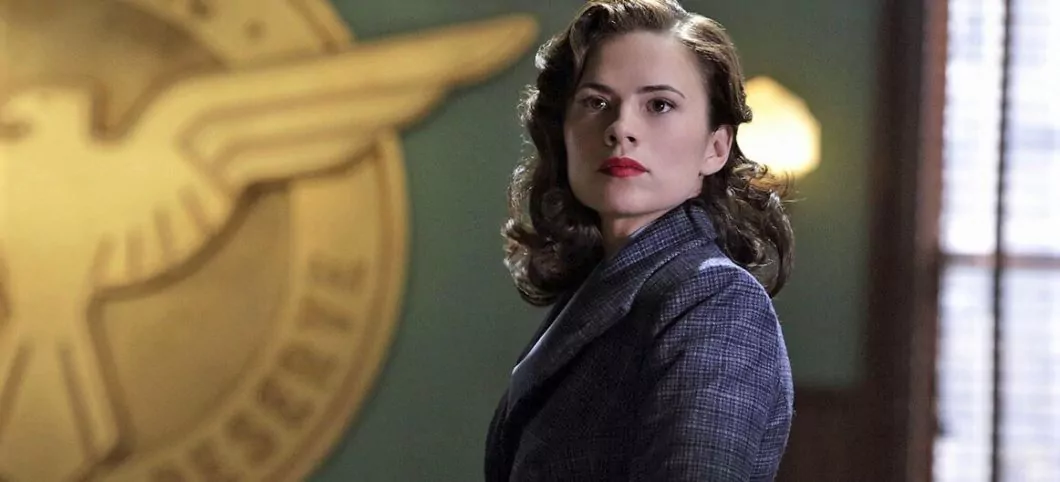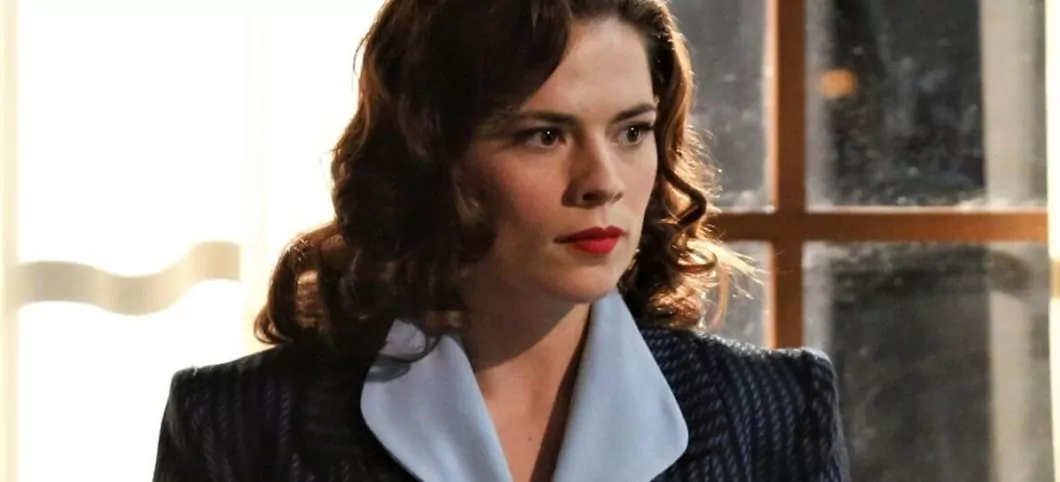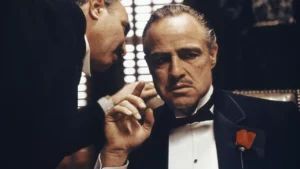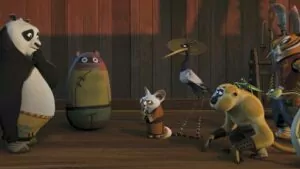
In recent years, the Marvel Cinematic Universe has been doing a wonderful and, if you’ll excuse the pun, a ‘marvellous’ job at characterising and portraying their female characters. Be it Black Widow and Scarlet Witch, who got their due credit a little later after they were first introduced, or characters like Captain Marvel, Gamora, Valkyrie and even Sylvie who were introduced as awesome and complex characters from the very start. These female characters are a thrill to watch on screen, as they have so much more to offer than simply being the ‘token girl’ of the group.
Amongst all of these names, there is one that isn’t mentioned as often as the rest, and that is the name of Margaret Elizabeth Carter, otherwise known as Peggy Carter. The problem with Peggy’s initial characterization was that, in spite of her being portrayed as a strong, talented and independent woman, in the end, she ends up being recognised as Captain America’s love interest. Just like Jane Foster from Thor and Pepper Potts from Iron Man, Peggy’s identity revolves around being the lady love of the superhero. She’s just the woman whose picture Steve Rogers has in his compass or the woman who shoots at his shield, which was not even tested, in an irrational spell of jealousy.
Credit where it’s due, Marvel did end up redeeming all these character sketches at one point or the other. Pepper eventually became CEO of Stark Industries and in the end, also got her own Iron Man Armour. There are talks, supposedly, about Jane Foster returning to a more prominent role in the upcoming Thor movie. However, the greatest improvement, at least according to me, was that of Peggy Carter’s character, when she got her own television series titled ‘Agent Carter’.
Marvel’s Agent Carter is an American television series created by Christopher Markus & Stephen McFeely for ABC. The series was produced by ABC Studios, Marvel Television, and F&B Fazekas & Butters, with Tara Butters, Michele Fazekas, and Chris Dingess serving as showrunners. It stars Hayley Atwell, James D’Arcy, Enver Gjokaj and Chad Michael Murray. The show maintains continuity with the MCU films and other television series.
Agent Carter is about Peggy Carter’s life after the assumed demise of Steve Rogers in the 1940s. Peggy has to keep her career as a secret agent of Strategic Scientific Reserve (SSR) under wraps, deal with sexism at her workplace, struggle to establish herself as more than Steve Rogers’ former lover, while also having to face some very dangerous organisations and people. The show ended after only two seasons, while still having the potential to go on for several more, or at least one more season. So here is me listing out why I believe Agent Carter deserved another season.
Agent Carter: Marvel Cinematic Universe’s Perfect Feminist Show
Agent Carter is, at its core, a feminist show. Not only because its main lead is a woman, for that is never enough to call any work of fiction a ‘feminist’ one, but also because of the themes and issues that it tackles. Moreover, not only does the show have the privilege of being addressed as a feminist show, but it is one that is done tremendously well. The fact of the matter is that a lot of movies and shows that claim to be propagating the concept and themes of feminism have been criticised. While creators of these works usually dismiss this criticism as hate, trolling and intolerance towards the concept, there are actually certain common mistakes these works make, and Agent Carter steers clear of them.
The first and most glaring error creators make is the ‘in-your-face’ treatment of the plot or character’s feminist aspects. Quite often, they break away from the narrative just to rub in whatever point they are trying to make. It appears that the story is weaved into the message, and not the other way around. It makes it really hard to take it seriously as a proper work of fiction when a certain narrative is being shoved down our throats instead of being depicted artistically and organically.
A popular example of this is the show Batwoman and the controversy surrounding its supposed ‘feminist’ narrative. I say supposed because it comes across as entitlement more than woman empowerment. There’s a moment in the series where Kate Kane a.k.a Batwoman claims that the batsuit would be perfect once it fits a woman and another instance where she says that she wasn’t going to let a man (Batman) take credit for a woman’s work. Here, Kate is making it all about gender instead of about her and Batman as individuals. She appears to demand credit and respect solely because she’s a woman and not because she’s done anything to earn it.
Agent Carter, on the other hand, is perfect in its portrayal of actual feminist perspectives and concerns. The sexism Peggy Carter faces in her workplace and in general, her work constantly being credited solely to her being involved romantically with Steve Rogers, her struggle to objectively solve the problem at hand and to not let everyone’s perception of her get to her- everything feels all too real. The only woman in an organisation filled with men, in the 1940s would naturally face all of that. In fact, sexism in the workplace is something women face even today, and it’s no uncommon occurrence. There is nothing forced or unnatural about that plotline.
Nor does Peggy constantly demand credit and recognition because she is a woman. She desires and demands those things because she deserves them. Because she has, in the series and in other instances, proven herself to be worthy of those sentiments over and over. Peggy has more to her than the ‘powerful woman’ trope. Apart from being extremely talented, strong and witty, she also has a complex personality and great character development. She has unique relationships with various characters on the show. She has her moments of strength and also several moments of weakness. She is a woman, yes, but more than that, she is THE Peggy Carter.
The other mistake that a lot of movies and shows claiming to be feminist make is using the ‘man-hating’ or the ‘can do everything better than the man’, or even worse, the ‘men are useless’ trope. Tell me this scenario does not sound familiar- A man, who is an expert at a particular task is trying hard to complete it, but fails. Then a woman, completely inexperienced in the same task, outdoes him in seconds. These kinds of scenes are a lazy attempt to portray women empowerment. Sure, they mean well, but they’re poorly executed. I mean, it’s wrong to undermine a woman’s capabilities, certainly, and no woman is obliged to prove anything to anyone, of course. The way this is depicted, though, sends all the wrong messages. The truth is every individual deserves the benefit of the doubt, but one cannot be shown as capable by showing another as completely useless.
However, at least this trope can be excused as an attempt to combat the old and exhausting misperception that women are incapable of almost anything on their own. On the other hand, some of these ‘strong’ female characters are characterised by their unexplained hate for men. That is their defining personality trait and is portrayed to be cool. Frankly, if hate towards approximately half of the species you belong to, and for absolutely no clear reason, is your primary personality trait, then that’s just sad. Then it’s no longer about equality and empowerment but rather about a twisted sense of revenge. We see these narratives being pushed forward in Batwoman, the new Star Wars films, among other examples.
Peggy Carter, too, does things better than some men in her organisation, but that is not credited to just her being a woman, but rather to her years of learning and field experience, aside from her wit and quick thinking. When she is undermined by her department, the audience feels her frustration because we know what she’s capable of. We’ve seen her strive and thrive and then be neglected, only to finally rise. Agent Carter handles this well by its treatment of Peggy’s character and priorities, as well as of the men in the series. Peggy has a lot going on in the series. She is grieving Steve Rogers, keeping her life as an SSR agent a secret and also dealing with the sexism in the SSR office.

The Treatment of Supporting Characters
Another commendable aspect of Agent Carter is the way it deals with its supporting characters. Not one character, whether good or evil, is written off as a two-dimensional plot device. Each character has a strong backing to explain what makes them the way they are. Whether it’s a grey character like Jack Thompson, whose sexist and overly ambitious nature can be credited to his mentors and to society’s expectations of what a good soldier should be like, or even a negative character like Whitney Frost, who you end up sympathising with just a little even after all the horrible things she does. Their stories give them depth.
Besides depth, these characters are also blessed with the gift of vulnerability. Peggy herself has several moments of vulnerability, portrayed beautifully and subtly. This does not take away anything from her ‘strong characterisation’, rather only serves as a breath of fresh air from female characters who show no emotion in order to appear ‘tough’, or only have one emotional moment in the entire course of their appearance just to give them a ‘humane’ moment, not to build on their character.
Going deeper, I cannot express in words the gratitude I have in my heart towards this show for creating emotive male characters. Of course, this attribute can be credited to a lot of the male characters of the MCU, but I have a special place in my heart for the guys in Agent Carter.
Let me start by addressing everyone’s favourite butler, Edwin Jarvis. Oh, my dear sweet, wonderful Mr. Jarvis. Jarvis is a treat to behold. He is sweet, skilled, loyal, incredibly smart and dutiful. His love and dedication for his wife are beyond beautiful. Moreover, his friendship with Peggy is probably one of the highlights of the show. Those two share a great deal of trust and bounce off of each other’s wit and sense of humour. It is the perfect example of how a platonic relationship between opposite genders should be written.
Peggy’s friendship with Howard Carter is another such example. Howard, in spite of being a womaniser, does not make an actual pass at Peggy. Instead, he respects her and has faith in her abilities and often turns to her for help. Even Peggy’s strained dynamic with Jack Thompson never transitions to a ‘enemies to lovers trope, and thank heavens for that.
As for the ‘love’ interests in the series, the mild-mannered yet dedicated Daniel Sousa does not let his feelings for Peggy cloud his judgement. He chooses to investigate Peggy, knowing fully well what evidence against her would mean. Dr Jason Wilkes’ character is more memorable as the Black scientist who struggled to make a name for himself, and the man who was willing to sacrifice himself for the good of mankind, rather than as the guy Peggy was romantically inclined towards. Their romantic dynamics with Peggy, as well as the love triangle that forms at one point, is done well and never gets annoying. More than that, it never overshadows the main plot but only adds to it.
The female characters make the strongest impression, however. Ana Jarvis, for instance, is a beautiful, strong woman who can put the greater good before her personal needs. She is a great friend to Peggy and a wonderful wife to Edwin Jarvis. Negative characters like Dottie Underwood and Whitney Frost are deadly and intimidating, interesting and believable, even if a little overpowered.
The Storyline of Agent Carter
Agent Carter may be charming in the way it portrays its characters or the way it approaches the feminist angle, but the magnetic force of the series that has your eyes glued to the screen is its plot and pacing. You could take away everything I just mentioned about the series, and it would still make for a compelling show. The story is closely linked to Captain America’s story, yet manages to exist as a separate entity. Cap’s character is mentioned and honoured throughout the show, but that never takes away the spotlight from its central characters, especially from Peggy.
Set in the time after Steve Rogers lands into an icy water body to save millions (spoiler alert?), the show follows the adventures of Peggy Carter as an agent of the SSR. She struggles over making her name in the SSR, an organisation dominated by men and where her worth is nothing more than Captain America’s ‘girl’. She decides to help an old friend in order to have a greater purpose in life, but soon gets caught in something so much bigger.
The story is paced wonderfully well. It gives the right amount of screentime to humour, action and emotion. The plot twists aren’t too many in number, so don’t worry about whiplash, but they’re strong enough to leave you gaping at the screen for a good amount of minutes. While the first season wraps up the main storyline neatly, the second season opens with an even more engaging plot. What stings, like really truly stings, is that the second season was not wrapped up like the first one was. Sure, the main source of conflict was taken care of, but the season still leaves a few things unattended to and ends in something of a cliffhanger. Another season to wrap up those loose ends would have been PERFECT. But alas, it only exists in my dreams.
The Movie Culture Synopsis
Marvel’s Agent Carter tells the story after the story, and my does it do a fantabulous job at that. It leaves no stone unturned while perfecting itself in terms of casting, storyline and characters. If only the world had taken it as seriously as its creators had. For, if I’ve not said it enough number of times already, it really deserved another season.



